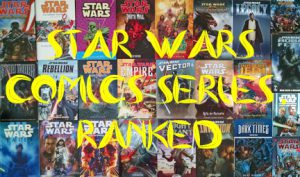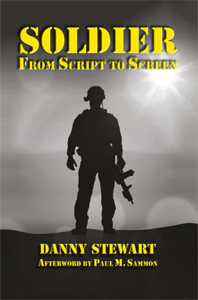Whatever you say about Danny Stewart’s “Soldier: From Script to Screen,” a 25th anniversary 134-page slice of obsessional archaeology about the Kurt Russell-starring sidequel to “Blade Runner,” one thing is undeniable. This is not a commercial endeavor.
Among Paul W.S. Anderson’s films, Stewart could’ve rung up more sales by chronicling “Event Horizon” (1997), which I hear name-dropped once a month. Or “Mortal Kombat” (1995) or the “Resident Evil” pictures (2002-present) or “AVP: Alien vs. Predator” (2004).
Stewart chose “Soldier” because he loves “Soldier,” as I do. And as I do even more after reading this collection of mostly interviews but also some essays. (Full disclosure: My RFMC review is among them, and I received a copy of the book in exchange for its use).

“Soldier: From Script to Screen” (2023)
Author: Danny Stewart
Publisher: BearManor Media
Genre: Interviews, analysis and essays on the 1998 film “Soldier”
The book can be purchased in hardcover or paperback via Amazon.
Like a lot of books that are one person’s passion project rather than a publishing-house tentpole, the copy editing leaves something to be desired. Stewart (“War is Hell: The Making of ‘Hellraiser III: Hell on Earth’ ”) essentially throws his interviews onto the page. So be it. Reading the book is like digging through X-Files buried in a warehouse, another cool thing from sci-fi in 1998.
A matter of taste
I shouldn’t get too high and mighty about how John Q. Public and Joe Schmo are dumb for not recognizing “Soldier’s” greatness and prescience. It is, of course, a matter of taste. In this case, Stewart and I are in the minority. The author doesn’t try to hide that.
In “From Script to Screen,” Stewart asks his interviewees (15 crew members and one supporting actor) what they think of “Soldier” as a finished film. One says he is shocked that it rates a mere 13 percent on Rotten Tomatoes. However, this is not a book full of people whining about how their work is underappreciated. Bizarrely, the opposite is the case.
Some say “Soldier” is “not their cup of tea.” Several label the end product a failure. I imagine that when Stewart scheduled these interviews, everyone said “You’re writing a book about ‘Soldier’? Why? That movie is bad.” Most nutso of all, screenwriter David Webb Peoples (who also wrote “Blade Runner”) has never seen “Soldier.”
Peoples is Stewart’s biggest get, and the most fascinating interview. He’s the only credited screenwriter, but he almost disowns “Soldier.” His original draft seemed to have emphasized the relationship between a soldier and a 1-year-old child.

Peoples was steered by his employers into a final draft that ages up the child to a filmable 5 and is broader and more commercial (at least in intent; it cost $60 million and made $14 million). “Soldier” features warfare, explosions and a hand-to-hand final fight. (The trailer goes a step further and backs that stuff with a stadium anthem, but don’t judge a movie by its trailer.)
More essays would’ve been welcome
The interviews boast enough technical tidbits to enliven my next viewing. Among them are a rabbit-hole of a section on how movies’ computer graphics (what you see on the monitor as the character uses the computer) were fabricated in the Nineties.
I would’ve liked more examinations of the story, characters and themes, but we get a couple good ones. Mark Stratton’s essay opens my mind to the notion of Todd’s 40 years of indoctrination as a metaphor for neurodivergence. Even though in his case it’s a sort of forced neurodivergence, there’s no denying that he’s a child in an adult’s body in terms of interpersonal relationships, a trait that defines autistic people.
John Kenneth Muir’s essay compares Russell’s Todd to Sylvester Stallone’s John Rambo, but he gets at key differences. Rambo is aware of the evils done to him, and he can’t quite get back to the human race. Todd is less aware of the evils done to him, but he can join the human race.
The big question
Here and there, “From Script to Screen” sprinkles in what I find to be the most fascinating question about “Soldier.” Is “Soldier” set in the “Blade Runner” universe? My essay – part of my “Philip K. Dick flashback” series — comes closest to exploring this issue in one fell swoop, but I only give it lip service, so you have to search Stewart’s tome for tidbits.
Peoples denies that he wrote “Soldier” as a “BR” universe film, whereas Anderson called it a sidequel in a Fangoria interview, which is why I thought of it as a sidequel from the start. The film’s famous Easter eggs – the computer screen listing Todd’s previous battles, including “BR’s” Tannhauser Gate and Shoulder of Orion – were provided by visual effects supervisor Van Ling, a sci-fi nerd. Despite being the screenwriter of both films, Peoples did not write the on-screen linkages.
Peoples didn’t intend to write a “BR” sidequel, but I contend that he accidentally wrote one anyway. He explores a different idea in each film, but the way these ideas flow on a continuum links the two works.
On the “Soldier” job, Peoples was uninterested in the sci-fi cliché of genetic engineering (and even less interested in replicants/androids, which he helped make into a cliche). He was interested in the social engineering of Todd and his contemporaries. However, Peoples created villains (the next-generation soldier, of which Todd’s rival/foil Caine is the leader) who are somewhat genetically engineered too.
“Soldier” is narrowly tailored to Todd and his new friends being targeted on the garbage planet, but at the fringes we can imagine blade runners hunting replicants. Authoritarian governments can do more than one horrible thing at a time. We can imagine overlapping technologies in the military industry. Replicants are the cutting edge, but they are expensive and rare. Human soldiers – engineered socially or genetically – are cheap and ubiquitous. Replicants are killed for political reasons. The Todds (for now) and Caines (eventually) are thrown out with the trash because they are cheap.
Bring your own theme
“Soldier’s” complexity rises from its simplicity. Your pet theme can be grafted onto Russell’s mostly silent performance. Stratton uncorks a fascinating one (that Nathan represents Todd’s inner child), but I’ll point to a broader theme: Obsolete technology is sometimes better than the latest technology.
“Soldier” has a hero lifted from the classic Western “Shane” and a visual aesthetic that’s time-capsuled alongside “Armageddon,” “Lost in Space,” “Sphere,” “Godzilla” and “Deep Impact.” Another indicator of the bygone era: It’s a 99-minute space epic. Even its detractors don’t accuse “Soldier” of overstaying its welcome.
That’s also not a criticism that will be leveled at Stewart’s brief book — except for vague derision (even slightly from Paul M. Sammon in his afterword) over the very existence of “Soldier: From Script to Screen.” A chronicle of a 25-year-old box-office silent-bomb that no one talks about – even as an interesting failure – should not exist. But then again, as far as the military is concerned in 2036, neither should Todd.

